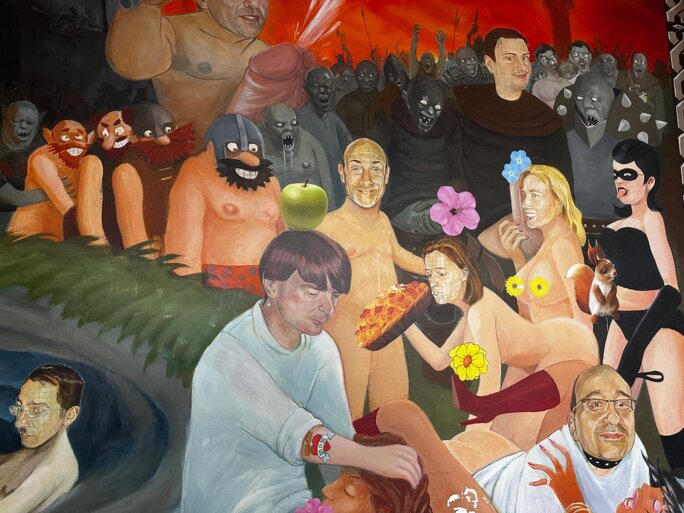In an extraordinary move on January 17th 2023, the French health ministry issued an order to the managements of hospitals across the country to remove “all frescos of a pornographic or sexist nature” present in their establishments.
The sexually explicit mural paintings in question, most often found on the walls of staff rooms for junior doctors, where they have meals and parties, “have the effect”, wrote the ministry, “of undermining a person’s dignity” and of creating “an intimidating, hostile, humiliating or offensive environment”. The removal of the frescos, it underlined, was part of the “obligation” of hospital managements “to ensure the health and safety” of their staff.
But still today, 16 months after that order was circulated, the frescos remain in at least ten hospitals run by the Paris public hospital authority, the Assistance publique-Hôpitaux de Paris (AP-HP), and at one of the hospitals among the CHU teaching hospital network in the southern city of Montpellier.
Late one afternoon this month at the Robert-Debré teaching hospital in north-east Paris, an AP-HP establishment specialised in paediatric care, the table in the junior doctor’s staff room was set for dinner for those on the night shift. It was May 3rd, and in the middle of the seating set along the table was an armchair decorated in the form of a vulva (see photo below). The four walls of the room were covered in frescos, two of which portrayed naked women in unequivocal sexually submissive positions. The men, mostly portrayed wearing clothes, include caricatures of the hospital’s consultants.

Enlargement : Illustration 1

Also in the staff room is a spinning wheel decorated with eight different punishments to be meted out to those who flout the staff room rules, one of which is never to talk about healthcare at the table. The wheel is spun and the offender must be dealt the punishment that it stops at. Some of these are mild-natured, like having to recount or sing “a funny story”. But most are of a sexual nature, such as that which announces a shifumi fessée, or “rock paper scissors spanking”, suitably illustrated with a photo of bare buttocks, while another is “Kama Sutra”, and another is “French kiss to your neighbour”. For someone who is non-consenting, such behaviour would of course amount to sexual assault.
“The issue of the frescos is behind us,” claimed Guillaume Bailly, president of the cross-union federation representing France’s junior doctors, the Intersyndicale nationale des internes. “They are being removed little by little, and junior doctors don’t feel attached to them, except for a few individuals. The issue that concerns us today are the hundreds of accounts of assaults of all types that we receive.” The revelations of sexual assault and abuse within the medical environment in France has, as in other countries, including Britain and the US, recently snowballed.
Audrey Bramly, who is in charge of dealing with cases of sexual and sexist violence for the SIHP union, which represents junior doctors in the AP-HP hospitals, agreed with Bailly. “That there are frescos, medical students’ humour, why not if everyone consents? Those who feel attached to them are a minority, the others are indifferent.”
Bramley said that she was herself a victim of sexual harassment when she was a non-resident student (extern) at a teaching hospital, when “a superior never stopped asking me if I was single, touching my thighs, stroking my back”.
Medicine is a profession that has access to bodies, to having sway [over patients], and which refuses to question itself over this power.
For Céline Piques, an activist with the feminist association Osez le féminisme (which began calling for the frescos to be removed in 2015), and who is also a member of the consultative public body, the High Council for Equality, “these frescos represent the apologia of a culture of rape”.
She argues that in the frescos and the cases of sexual assaults “behind closed doors” in the medical environment there is “a continuum, that of the impunity of sexist and sexual violence promoted by the culture of medical students […] The resistance to their removal is further proof that the medical profession refuses to place itself in question”.
She criticised the health ministry’s approach to removing the frescos because, she said, it allowed “time for hospitals to remove them on the pretext of a concertation, because they are supposedly part of the memory and heritage of hospitals”, which she said was “crazy”.
“Medicine is a profession that has access to bodies, to having sway [over patients] and which refuses to question itself over this power,” added Piques.
Patrick Pelloux is a doctor with the SAMU accident and emergency (A&E) services in Paris, and founder of a professional association representing A&E medics. He became well-known to the public, first as a whistleblower over the numbers of deaths during the 2003 heatwave, and subsequently with his regular appearances in the media and as a columnist for the satirical magazine Charlie Hebdo. Earlier this year he was publicly accused by the head of the infectious diseases unit at the Paris Saint-Antoine hospital, Karine Lacombe, of past sexual harassment.
In an interview published in weekly news magazine Paris Match, Peloux denied Lacombe’s accusation that he acted like a sexual “predator”. But, he said, in the past “What we used to say and do is unfeasible today, that’s for sure, but we had a good laugh”.
Women served up on trays
On March 8th, the date designated as International Women’s Day, a small group of junior doctors staged a protest at one of the eight hospitals that make up the CHU teaching hospital network in Montpellier, southern France. Their targets were frescos in the staff room dining area at the Lapeyronie hospital, one of which depicts men having sex with women served to them on trays, while another presents an orgy among previous medical students.
The protesters drew crosses over some of the painted figures and pasted stickers with slogans including “The canteen is not youporn”, “Medical student culture or rape culture?”, “50% of junior doctors victims of sexual and sexist violence. What’s it like to see that every midday?” and “Halt the sexism of the 1970s”.
The same day, Philippe Cathala, the president of the local branch of the Ordre des Médecins (the French doctors’ regulatory body) took to Facebook with a post in which he called on the head of the junior doctors union to file a complaint over the fresco protest and to denounce what he called “la cancel culture”. Cathala, a pathologist with the Montpelier CHU, complained that “to mix up artistic representations with acts of violence results from crass ignorance”.
“A painting has never assaulted anyone!” he continued. “This outrage hurts me, me and all the male and female colleague volunteers who are represented with pride on these frescos.” Replying to his post, some of his colleagues wrote of a “profanation”. Women doctors also joined in against the protest, with one writing: “I’m disgusted. I was so magnificent on it [the fresco].”

Enlargement : Illustration 2

“Some junior doctors are shocked by these frescos, they must obviously be listened to,” commented Killian L’helgouarc’h, president of the SILR union representing junior doctors in Montpellier and the surrounding Languedoc-Roussillon region, who total around 1,500. “The doctors who are in place are concerned at least because they are represented [on the frescos], but I think it’s firstly for the junior doctors to express themselves. It is their living space.”
An official with the Sud Santé union at the Montpellier CHU, Yves Morice, underlined that the doctors are not the only people exposed to the pornographic frescos, citing cleaners and canteen workers. “The hospital management is responsible for the physical and mental wellbeing of all the staff,” he said.
The management of the CHU has made no public comment following the March 8th protest, but has commissioned the SILR union to supervise a working group on the subject of the future of the frescos, and which will include all parties concerned.
A doctors' fresco depicting the rape of French health minister
The public hospital management authority for the Paris region, the AP-HP, has announced that “the frescos of a pornographic and sexist nature” will be removed from its establishments “between May and the end of 2024” after consultation with “the persons concerned”.
At the Robert-Debré hospital in north-east Paris, according to an in-house AP-HP document which Mediapart has consulted, “the choice was locally made to cover over the ‘sensitive’ zones of the frescos with stickers”. This refers to the placing of flowers, carrots, mushrooms, rabbits and squirrels over the depicted genitalia, buttocks and breasts which in fact do little to remove the pornographic or sexist nature of the paintings.

Enlargement : Illustration 3

The in-house document also reports a “strong reluctance” in other hospitals to remove the frescos. It describes how, in the Beaujon hospital in the north Paris suburb of Clichy, “a doctor, on his own initiative, has recently carried out an opinion survey of the medical community [in which], 67% said they were in favour of a preservation [of the frescos] as they are”. The document says that in the end, the hospital’s “executive committee” decided that the frescos “will be covered over in a manner of being preserved (for example, behind a sheet of plywood)”.
The feminist association Osez le féminisme attempted to obtain the removal of the frescos in the AP-HP hospitals by applying for a summary judgment to that effect (a provisional measure, usually before a court hearing in full) on the grounds of the “inertia” of management to resolve the issue. But on April 26th, a Paris administrative tribunal rejected the move, arguing that “measures have been taken, notably at the Robert-Debré hospital, and negotiations are ongoing in different establishments”. That ruling suggests the tribunal was not informed of the reality of the situation at Robert-Debré.
“What’s absurd is that, since 2022, it is now the fifth administrative recourse instigated by Osez le feminisme […] to try to get the law respected,” said Lorraine Questiaux, the association’s lawyer. “In face of this blockage, the intervention of an administrative judge is indispensable to protect women in hospitals and to put an end to this culture of rape.”
Osez le féminisme has campaigned for the removal of the frescos since 2015. It’s then president, Anne-Cécile Mailfert, was harassed by doctors on social media for having denounced a scene on one of the frescos, in the doctors’ staff room at the CHU teaching hospital in centre-west city of Clermont-Ferrand, in which the then health minister, Marisol Touraine, was the victim of a rape. In 2018, two doctors were handed fines by a Paris court for public insults against Mailfert “on the grounds of gender”.
Contacted by Mediapart, Marisol Touraine said the fresco had “deeply marked” and “shocked” her, and that what left an impression upon her was that “so many doctors, who were otherwise completely polite and amicable towards me, didn’t understand where the problem was”.
-------------------------
- The original French version of this report can be found here.
English version by Graham Tearse


